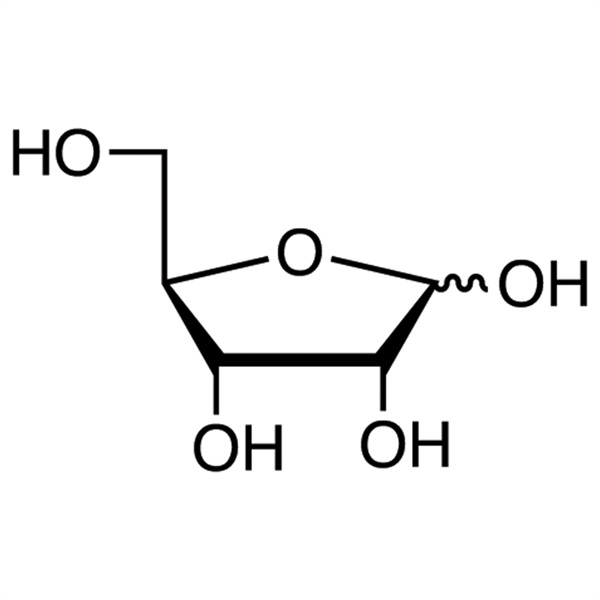Chemical Properties:
D-(-)-Ribose (CAS: 50-69-1) AJI97 Test Method D-(-)-Ribose, when dried, contains not less than 97.0 percent and not more than 102.0 percent of D-(-)-Ribose (C5H10O5). Description: White crystals or crystalline powder, sweet taste Solubility (H2O, g/100g): about 83 (25℃) Specifications: Specific Rotation [α]20/D: Dried sample, C=4, H2O State of Solution (Transmittance): 0.5g in 10ml of H2O, spectrophotometer, 430nm, 10mm cell thickness. Heavy Metals (Pb): 2.0g, (1), ref: 2.0ml of Pb Std. (0.01mg/ml) Arsenic (As2O3): 1.0g, (5), ref: 2.0ml of As2O3 Std. Other Saccharides: Chromatographically not detectable. Test sample: 10μg, A-4-a Loss on Drying: In vacuum, at 60℃ for 3 hours Residue on Ignition (Sulfated): AJI Test 13 Assay: Dried sample, 1.0g/500ml →10ml, 0.1mol/L Na2S2O3 1ml=1.877mg C5H10O5 pH: 1.0g in 10ml of H2O Recommended storage limit and condition: Preseved tight containers at controlled room temperature (1 years).Shanghai Ruifu Chemical Co., Ltd. is the leading manufacturer and supplier of D-(-)-Ribose (CAS: 50-69-1) with high quality, AJI97 standard, production capacity 1000 tons per year. Our products sell well in domestic and international market, trusted by customers. We can provide worldwide delivery, small and bulk quantities available. If you are interested in D-(-)-Ribose, Please contact: alvin@ruifuchem.com| Item | Specifications |
| Description | White Crystals or Crystalline Powder; Sweet Taste |
| State of Solution | ≥95.0% (Transmittance) |
| Assay | 97.0%~102.0% (on Dried Basis) |
| Purity (HPLC) | ≥99.0% |
| Melting Point | 80.0℃~ 90.0℃ |
| Specific Rotation [α]D20 | -18.0°~-22.0° (Dried Sample, C=4, H2O) |
| Loss on Drying | ≤2.00% |
| Residue on Ignition (Sulfated) | ≤0.20% |
| Heavy Metals (Pb) | ≤10ppm |
| Arsenic (As2O3) | ≤2ppm |
| Other Saccharide | Chromatographically Not Detectable |
| Aerobic Plate Count | ≤100cfu/g |
| Pathogenic Bacteria | Negative |
| Solubility in H2O | 100mg/1ml in Water, Clear Pass |
| Test Standard | AJI97 Standard (AJINOMOTO Amino Acid Specifications) |
| Usage | Pharmaceutical Intermediates; Food Additives; etc. |
Description:
Specifications:
AJI97 Test Method:
| Chemical Name | D-(-)-Ribose |
| Synonyms | D-Ribose; Dextro-Ribose; Ribose; D-RIB |
| CAS Number | 50-69-1 |
| CAT Number | RF-PI219 |
| Stock Status | In Stock, Production Scale Up to Tons |
| Molecular Formula | C5H10O5 |
| Molecular Weight | 150.13 |
| Melting Point | 80.0℃~ 90.0℃ |
| Density | 1.6810 |
| Sensitive | Hygroscopic |
| Water Solubility | Soluble in Water. Insoluble in Ether |
| Brand | Ruifu Chemical |
Advantages:
FAQ:
Application:
Shanghai Ruifu Chemical Co., Ltd. is the leading manufacturer and supplier of D-(-)-Ribose (CAS: 50-69-1) with high quality, is widely used as pharmaceutical raw materials, health products, food additives and so on. 1. D-(-)-Ribose is used as the most promising starting material for the first approved domestic oral drug Azfudine for COVID-19. 2. D-(-)-Ribose is a key pharmaceutical intermediate of many nucleotide drugs. Nucleic acid drugs are an important means of human treatment of viruses, tumors and AIDS. D-(-)-Ribose is an important intermediate of many nucleic acid drugs. D-(-)-Ribose is mainly used as a very basic source of metabolism of life. It is also used as a precursor for virazole, adenosine, thymidine, cytidine, fluoro-thymidine, 2-methyl adenosine, pyrromonazole toxina and adenosine methionine. It is further used in the synthesis of vitamin B2 (riboflavin), tetra-O-acetyl-ribose and nucleoside. It finds application as food additives and as supplement in cell culture. 3. In the field of medicine, D-(-)-Ribose is an important intermediate and starting material for a variety of nucleosides, anti-tumor and other drugs. Nearly 50% of the antiviral drugs in clinical use are nucleosides, such as Capecitabine, Ticagrelor and Remdesivir, which all use D-(-)-Ribose as the intermediate and starting material. 4. D-(-)-Ribose is used as the starting material for the so-called elixir NMN; D-(-)-Ribose is also used as a functional new beverage additive and a feed additive to promote the development of animal pups. 5. D-(-)-Ribose is a dietary supplement in the U.S. market and has been approved by the FDA as a novel food ingredient. When ingested more than 200mg/ (kg·h) ribose may cause diarrhea. Excessive intake can cause intestinal dehydration. A small number of people may experience mild symptoms such as nausea and dizziness, but most people have no adverse effects when the dosage is less than 15g/d. In addition, ribose has a short half-life, reaching its maximum value in about 30 minutes and being absorbed in about 120 minutes. Although ribose is an effective way to replenish ATP in muscles, exercise experts do not recommend it as an energy booster for healthy young people. 6. D-(-)-Ribose is a carbohydrate, or sugar, used by all living cells and is an essential component in living organisms for energy production. It has a sweet taste. D-(-)-Ribose is mainly used as a very basic source of metabolism of life. It finds application as food additives and as supplement in cell culture. D-Ribose (mixture of isomers) is an energy enhancer, and acts as a sugar moiety of ATP, and widely used as a metabolic therapy supplement for chronic fatigue syndrome or cardiac energy metabolism.

| Hazard Codes | Xi - Irritant | RTECS | VJ2275000 |
| Risk Statements | 36/38 | F | 3-10 |
| Safety Statements | 24/25-37/39-26 | TSCA | Yes |
| WGK Germany | 3 | HS Code | 2940009090 |
Safety Information:
Package & Storage:
Package: Fluorinated Bottle, Aluminum foil bag, 25kg/Cardboard drum, or according to customer's requirement. Storage Condition: Hygroscopic. Store in sealed containers at cool, dry and ventilated warehouse away from incompatible substances. Protect from light and moisture. Incompatible with strong oxidizing agents.
Storage Condition: Hygroscopic. Store in sealed containers at cool, dry and ventilated warehouse away from incompatible substances. Protect from light and moisture. Incompatible with strong oxidizing agents. 
